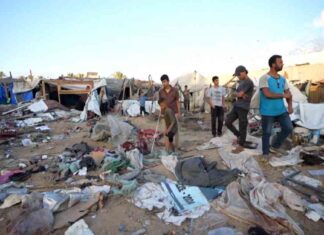New Zealand Pilot Phillip Mehrtens Released by Papua Rebels After 19 Months
New Zealand pilot Phillip Mehrtens has finally been released by rebels in Indonesia’s Papua region after a harrowing 19-month ordeal. Indonesian police confirmed that Mehrtens was flown out of the mountainous Nduga area and appears to be in good health, bringing a sense of relief to his family and loved ones.
The pilot was abducted by fighters from the West Papua National Liberation Army (TPNPB) on February 7 last year after landing his small commercial plane in the remote region of Nduga. The rebels had demanded Papua’s independence as a condition for Mehrtens’s release, highlighting the ongoing conflict in the region.
Reunion with Family and Well-Being
After being freed, Mehrtens was flown to Timika where he is currently undergoing health checks and a physiological examination. Indonesian authorities have assured that he is in good health, providing some comfort to his family who have been anxiously awaiting his return. The New Zealand government has confirmed that Mehrtens has been able to speak with his family, marking a joyous reunion after months of uncertainty.
Foreign Minister Winston Peters expressed relief at the news of Mehrtens’s release, stating, “We are pleased and relieved to confirm that Phillip Mehrtens is safe and well and has been able to talk with his family. This news must be an enormous relief for his friends and loved ones.”
Longstanding Conflict in Papua
The conflict in Papua dates back to the controversial referendum in 1969, which led to the territory’s incorporation into Indonesia. The Indigenous people of Papua, who are ethnically Melanesian, have been fighting for independence ever since, facing ongoing repression and violence from Indonesian forces. The abduction of Mehrtens by the TPNPB rebels is just one example of the deep-rooted tensions in the region.
Despite international calls for dialogue and peaceful resolution, the conflict in Papua continues to escalate, with acts of violence and human rights abuses reported on a regular basis. The release of Mehrtens is a rare moment of relief in an otherwise volatile situation, highlighting the need for a comprehensive and inclusive approach to addressing the grievances of the Papuan people.
International Response and Diplomatic Efforts
The New Zealand government has been closely monitoring Mehrtens’s case and working with Indonesian authorities to secure his release. The successful outcome is a testament to the diplomatic efforts and cooperation between the two countries in resolving the crisis. Foreign Minister Winston Peters thanked the Indonesian government for their efforts in ensuring Mehrtens’s safe return.
Indonesia, on its part, has reiterated its commitment to maintaining peace and stability in Papua while addressing the legitimate concerns of the Papuan people. The release of Mehrtens is seen as a positive step towards building trust and fostering dialogue between the government and the rebel groups, paving the way for a more peaceful and inclusive future for the region.
In conclusion, the release of Phillip Mehrtens after 19 months in captivity is a ray of hope in the long-standing conflict in Papua. It underscores the importance of diplomatic efforts, international cooperation, and dialogue in resolving the grievances of the Papuan people and ensuring lasting peace and stability in the region.



























